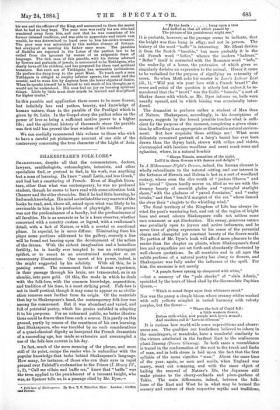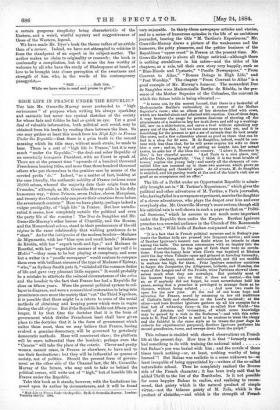SHAKESPEARE'S FOLKLORE.•
SHAKESPEARE, despite all that the commentators, doctors, lawyers, ornithologists, entomologists, botanists, and other specialists find, or pretend to find, in his work, was anything but a man of learning. He knew " small Latin, and less Greek," and had but a smattering of French. Even of English litera- tare, other than what was contemporary, he was no profound student, though he seems to have read with some attention both Chaucer and the older chronicles. But if he had little learning, he had much kno wledge. His mind assimilated the very marrow of the books he read, and, above all, seized upon what was likely to be serviceable to him in his profession of playwright. His genius was not the predominance of a faculty, but the predominance of all faculties. He is as accurate as he is a keen observer, whether concerned with a country custom or legend, with a craftsman's detail, with a fact of Nature, or with a mental or emotional phase. In especial, he is never diffuse. Eliminating from his plays some portions addressed to the gallery, scarcely a line will be found not bearing upon the development of the action of the drama. With the richest imagination and a boundless fertility, he is hardly ever tempted to use an extravagant epithet, or to resort to an overstrained metaphor or an unnecessary illustration. One secret of his power, indeed, is the might suggested by his sobriety. With all this, he is passing sweet. The commonest facts of human experience, in their passage through his brain, are transmuted, as in an alembic, into pure gold. Of this, the mode in which he deals with the folk-lore, with the common knowledge, superstition, and tradition of his time, is a most striking proof. Folk-lore is not in itself poetical, though it may come to appear so as civilis- ation removes men further from its origin. Of the materials that lay to Shakespeare's hand, the contemporary folk-lore was among the commonest. But it was abundant and varied, and fall of potential poetry, which his genius unfolded in adapting it to his purposes. For an unlearned public, no better illustra- tions could be drawn than from such a source. It is partly on this ground, partly by reason of the scantiness of his own learning, that Shakespeare, who was troubled by no such considerations of a quasi-classical dignity as hampered the French dramatists of a succeeding age, has made so extensive and unexampled a use of • the folk-lore current in his day.
In fact, much of the mere meaning of the phrase, and more still of its point, escape the reader who is unfamiliar with the popular knowledge that lurks behind Shakespeare's language. How many, fox:instance, of those who run their eyes in rapid perusal over Falstaff's exclamation to the Prince (I. Henry IV., i., 2), "Call me villain and baffle me," know that " baffle " was the term applied to the punishment of a recreant knight, who was, as Spenser tells us, in a passage cited by Mr. Dyer,— • Folk-lore of Shakespeare. By Bev. T. F. Thiselton Dyer. London : Griffith said Ferran.
"By the heels hung upon a tree And baffled so that all which passed by The picture of his punishment might see."
It is probable, however, as the passage seems to indicate, that the knight was thus hung in effigy, and not in person. The
history of the word " baffle " is interesting. Mr. Skeat derives
it from the Scotch " bauchle," but more probably it is the old French word " befler," whence the modern " bafouer." " Befler " itself is connected with the Romance word " befo," the under-lip of a horse, the protrusion of which gives so singularly derisive an expression to the animal. Hence it came to be verbalised for the purpose of signifying an extremity of scorn. So when Moth asks his master in Love's Labour Lost 1), " Will you win your love with a French brawl P" the sense and point- of the question is utterly lost unless it be re- membered that the " brawl" was the Gallic " bransle," a sort of Shaker dance with which, as Mr. Dyer informs us, balls were
usually opened, and in which kissing was occasionally intro- duced.
The dramatist is perforce rather a student of Man than of Nature. Shakespeare, accordingly, in his descriptions of scenery, suggests by the fewest possible touches what is suffi- cient for the purpose of the moment, completing a given situa- tion by affording it an appropriate or illustrative natural environ- ment. But bow exquisite these settings are ! What more delicately conceived portrait of a fairy's haunt has ever been drawn than the thymy bank, strewn with oxlips and violets, o'ercanopied with luscious woodbine and sweet musk roses and eglantine, where, in a natural boudoir
" Sleeps Titania, sometime of the night, Lnll'd in these flowers with dances and delight "!
In A Midsummer-Night's Dream•, indeed, the human element is wholly subordinate to the natural setting, and our interest in the fortunes of Hermia and Helena is lost in a sort of woodland
ecstasy, where even the dire wrath of "jealous Oberon" and his " proud " Queen hardly moves its, filled as we are with the dreamy beauty of moonlit glades and " spangled starlight sheen," with the gladness of " paved fountains," and " rushy brooks," and that " beach'd margent of the sea " where danced the elves their " ringlets to the whistling wind."
The floral territory of the Kingdom of Life has always in- vited the poet's wandering feet, and out of the region of bright hues and sweet odours Shakespeare culls not seldom some rare ornament or apt illustration. His sunny, generous nature was peculiarly open to joyous and active influences, and he never tires of giving expression to his sense of the perennial charm and changeful yet constant beauty of the flower-world.
No portion of Mr. Dyer's book will afford more pleasure to the reader than the chapter on plants, where Shakespeare's floral lore and sympathies are set forth and abundantly illustrated by well-chosen quotations. In all countries and in all ages the subtle perfume of a natural poetry has clung to flowers, and Shakespeare was fully under the influence of the spell. For him, the anemone is not merely
" A purple flower sprung up chequered with white," —but a memory of the "pale cheeks" of "slain Adonis," sprinkled by the tears of blood shed by the disconsolate Paphian Queen,— "Which in round drops upon their whiteness stood."
Nor was the pansy a simple bloom where creamy whites washed with soft yellows mingled in varied harmony with velvety purples, bat the flower-
" Where the bolt of Cupid fell :
. . . . . a little western flower,
Before milk-white, now purple with love's wound ; And maidens call it Love-in-idleness.' "
It is curious how world-wide some superstitions and observ- ances are. The qualities our forefathers believed to inhere in the mandragore, or mandrake, have a wonderful similarity to the virtues attributed in the furthest East to the araliaceous plant Jinseng (Panax Ginseng). In both cases a resemblance
is traced in the conformation of the root to the trunk and limbs of man, and in both stress is laid upon the fact that the first syllable of the name signifies " man." About the same time of the year, again, as men and maids, when England was merry, went out a-maying, and with the same object of
hailing the renewal of Nature's life, the Japanese still -make picnics to the cherry-orchards and plum-gardens of Tokio. The main differences, indeed, between the folk- lores of the East and West lie in what may be termed the
scenery and vesture of their respective myths and traditions, a certain gorgeous simplicity being characteristic of the Eastern, and a weird, wistful mystery and suggestiveness of those of the Western, legend.
We have made Mr. Dyer's book the theme rather of an article than of a review. Indeed, we have not attempted to criticise it from the standpoint of an expert in its subject-matter. The author makes no claim to originality or research ; the book is confessedly a compilation, but it is none the less worthy of welcome by all who have the study of Shakespeare at heart, or love to be brought into closer perception of the sweetness and strength of him who, in the words of his contemporary panegyrist,—
" Still doth live,
While we have wits to read and prairie to give."

































 Previous page
Previous page